Safadi, German counterpart discuss bilateral relations, regional developments
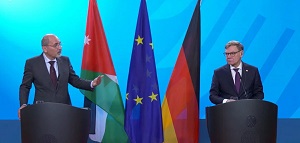
The Jordan Times
AMMAN — Deputy Prime Minister and Foreign Minister Ayman Safadi on Tuesday held talks with German Foreign Minister Johann Wadephul, during which they discussed ways to enhance bilateral relations and reviewed regional developments.
During the meeting, Safadi and Wadephul reviewed the results of talks held in Amman last month on expanding the horizons of bilateral cooperation between the two countries in a number of key developmental sectors, including water, investment, education, vocational training, tourism, and defence, according to a Foreign Ministry statement.
Safadi also praised the high level of relations between the two countries and Germany’s continued support for Jordan in development projects and in addressing the repercussions of regional crises.
The two ministers discussed efforts to maintain the ceasefire in Gaza, stressing the need to uphold it and to move forward within a comprehensive framework that ensures security, stability and reconstruction in the Strip, as well as a genuine political horizon for achieving a just and lasting peace based on the two-state solution.
They also underlined the importance of the immediate and adequate delivery of humanitarian assistance to all parts of Gaza, and agreed to continue bilateral cooperation in these efforts.
On developments in the West Bank, Safadi emphasisedthe need to halt all illegal Israeli measures that undermine the two-state solution and fuel tensions, particularly settlement expansion, land confiscation, restrictions on the Palestinian economy and attempts to alter the historical and legal status quo of Islamic and Christian holy sites in Jerusalem.
In a joint press conference with the German foreign minister, Safadi underscored the strong ties between the two countries, which stretch back 70 years of diplomatic relations.
Safadi stressed that Germany is a key partner for Jordan, noting that the Kingdom highly values Berlin’s efforts to help address the pressures of regional crises, including the challenges of hosting refugees and security threats.
He added that Germany’s support for Jordan’s development projects is of great importance and expressed the Kingdom’s sincere gratitude for it.
“Jordan looks forward to expanding cooperation that builds on the longstanding friendship between the two countries, strengthens bilateral ties, and furthers their shared goal of promoting security, stability, and peace in the region,” he said.
Safadi also added that Jordan supports all of Germany’s efforts to achieve peace in Ukraine, as peace there contributes to Europe’s security.
He said Jordan similarly seeks a just peace in the Middle East, which can only be achieved when the Palestinian people gain their freedom, the right to a state, a dignified life, and full sovereignty over their national territory within the framework of the two-state solution, widely recognised by the international community as the only path to lasting peace.
Safadi stressed that Jordan’s immediate priority is to consolidate the ceasefire, which was achieved through significant efforts following the launch of US President Donald Trump’s plan, with the cooperation of all parties.
He added, “We believe that implementing this plan and moving to the second phase of the peace agreement is a necessary step that must begin without delay, as time is not on anyone’s side.”
“Since the signing of the ceasefire in Gaza, there have been more than 500 Israeli violations, and nearly 340 Palestinians have been killed. This must stop, as consolidating the ceasefire is a key step towards moving to the next phase and putting us on the path to broader peace and stability,” Safadi added.
Safadi said that over 90 per cent of Gaza’s population depends on humanitarian aid, with most residents receiving just one meal a day.
He noted that the volume of aid entering the Strip remains far below what is required, and according to the UN, only around 20 percent of Gaza’s needs are currently being met, highlighting the urgent need for Israel to lift all restrictions on aid deliveries.
He also emphasised that there is no legal, humanitarian, or moral justification for keeping crossings closed, and that all types of aid, including relief, housing, medical supplies, and other essential goods, must be allowed into Gaza.
Safadi highlighted that Jordan has served as a hub for humanitarian aid to Gaza and has coordinated with Germany to ensure its delivery. He added that the Kingdom is capable of sending around 250 trucks a day to the Strip once Israel lifts its restrictions on the entry of humanitarian assistance.
He stressed that Gaza and the West Bank must remain connected, reaffirming Jordan’s readiness to work with partners in the United States, Europe, and the region to sustain progress toward stabilising Gaza, easing tensions, and paving the way for a genuine political horizon that advances the cause of peace.
Safadi stressed the need to prevent an outbreak of violence in the West Bank while consolidating stability in Gaza, warning that the serious escalation in the West Bank threatens security and stability across the region and undermines ongoing efforts in Gaza.
He condemned settler violence in the West Bank, noting that Palestinians face seven to eight daily attacks, including arson, vandalism, and restrictions on harvesting olives, with little accountability for the perpetrators.
He called for an end to settlement expansion, the protection of Palestinian lands, and respect for the rights of Muslims and Christians in Jerusalem, stressing the need to uphold the historic and legal status of the city’s holy sites.
Safadi reaffirmed Jordan’s role in protecting the Islamic and Christian holy sites in Jerusalem and safeguarding the right to worship, highlighting the Kingdom’s historic Hashemite custodianship over these sites.
The ministers also reviewed the situation in Syria and the Syrian government’s reconstruction efforts. Safadi reiterated Jordan’s support for reconstruction efforts that preserve Syria’s unity, security, sovereignty and territorial integrity, while condemning Israeli actions aimed at spreading discord and chaos and its attacks on Syrian territory.
Safadi emphasised that Lebanon’s sovereignty must be upheld, urging a stop to all escalatory actions that threaten to increase tensions and destabilise the region.
Wadephul affirmed the strength and solidity of German-Jordanian relations, highlighting the importance of continued cooperation and coordination on issues of mutual interest and regional developments.
Wadephul praised Jordan’s key role in providing humanitarian aid to Gaza and its central efforts in promoting stability and peace in the region, highlighting the importance of the strategic partnership between Germany and Jordan.
He also underlined that the German government regards Gaza as an inseparable part of the West Bank and a vital pillar of an independent Palestinian state based on the two-state solution.
Safadi also met with the chair and members of the German Bundestag’s Foreign Affairs Committee to discuss the importance of strengthening bilateral ties and reviewing the latest regional developments.
During the meeting, Safadi affirmed that US President Donald Trump’s plan achieved key priorities, including ending the war, alleviating the humanitarian suffering in Gaza, and preventing the displacement of Palestinians.
He stressed that any plan for Gaza must rest on fundamental pillars, including ending the war, delivering humanitarian aid and early recovery, rebuilding the Strip, ensuring security and effective governance, and establishing a clear political horizon aimed at achieving a just and comprehensive peace through the creation of a sovereign Palestinian state along the June 4, 1967 lines, with East Jerusalem as its capital, in accordance with the two-state solution.
Safadi said that Jordan, in coordination with its American and European partners, views the top priority in the region as ending the killing and starvation of Palestinians, facilitating the delivery of aid, and restoring hope to the people. He added that most countries around the world that recognise the State of Palestine, including many in Europe, agree that the two-state solution is the sole path to a just and lasting peace.
He highlighted that UN Security Council Resolution 2803 on Gaza set the framework for solidifying the ceasefire, guaranteeing prompt and sufficient humanitarian assistance, preventing displacement, ensuring security, and paving the way for concrete measures to achieve a just peace that establishes a sovereign, independent Palestinian state.
Safadi underlined the importance of training and deploying the Palestinian police to safeguard the security of the Palestinian people, while noting that the primary role of the international stabilisation force should be to prevent clashes between Palestinians and Israelis. He stressed that Israel must withdraw from Gaza to prevent the conflict from continuing.
He also reaffirmed that Jordan is not deploying its forces in Gaza, but will maintain its humanitarian role in the Strip by facilitating the entry of aid in coordination with friendly and brotherly countries. He added that while Jordanian troops cannot be sent on the ground, the Kingdom can support the training of the Palestinian police, contribute through the Civil-Military Coordination Centre, and continue to play a key role in delivering aid, as it has done previously.
Safadi reiterated that the security of southern Syria is a matter of national security for Jordan, reaffirming the Kingdom’s support for sisterly Syria in its reconstruction efforts based on principles that ensure its unity, sovereignty, stability, and the safety of its territory and citizens.
Latest News
-
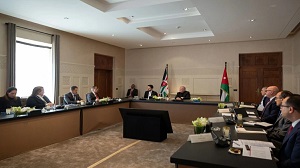 King reviews economic vision’s progress in 3rd quarter of 2025
King reviews economic vision’s progress in 3rd quarter of 2025
-
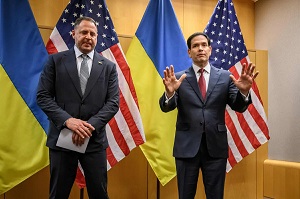 Washington, Kyiv say a peace deal must 'fully uphold' Ukraine sovereignty
Washington, Kyiv say a peace deal must 'fully uphold' Ukraine sovereignty
-
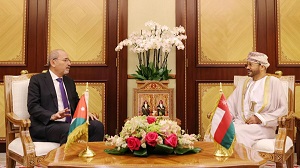 Safadi, Omani counterpart hold talks ahead of joint committee session
Safadi, Omani counterpart hold talks ahead of joint committee session
-
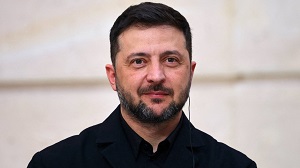 Zelensky hails “important steps” in peace talks but says more work needed
Zelensky hails “important steps” in peace talks but says more work needed
-
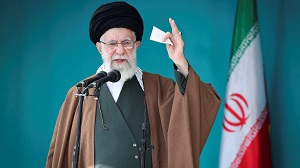 Iran warns of attempts to kill supreme leader Khamenei
Iran warns of attempts to kill supreme leader Khamenei